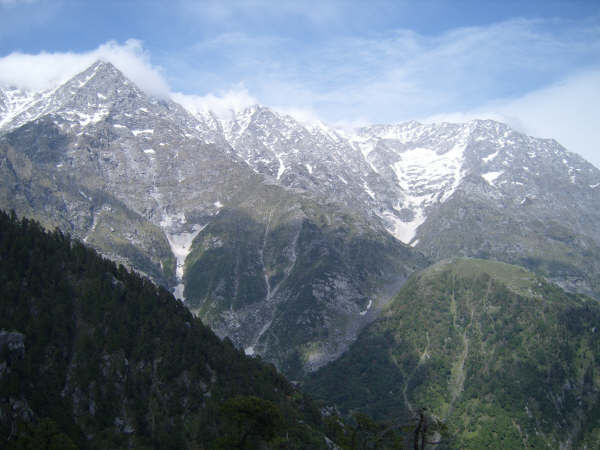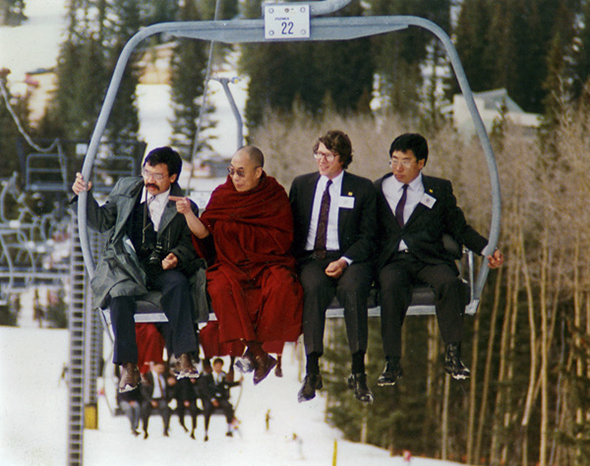 |
| View from McLeod Ganj |
This day has other plans. Our little group makes the trek up to the monastery of the Dalai Lama and we are greeted by saffron-robed monks with shaved heads, men and women alike. I start speaking to a well-educated monk from France and she tries to explain their lives to me. I am again struck by the natural, not forced, good humour that surrounds me.
After a brief tour, we have a tasty vegetarian lunch and towards the end, there is a big commotion. I mean these are quiet, happy monks. What is happening?
I duck out of the dining room to see a courtyard of monks together in groups of three. They are all arguing in loud voices. What gives? Punctuating the many gestures and the wagging of fingers is a periodic clap as the right hand is lowered toward the left to produce a loud sound -- one hand clapping! This seems to be a signal for the monks to exchange places in their triads.
I find my French monk and she explains that they believe in maintaining wellness of mind and body. Part of their wellness routine is to exercise the gifts of the mind by debating. They were likely discussing religious points but make no mistake, these were heated arguments. And the clap? Well, that's the point when the referee in the triad thinks a good point has been made and at this, they change places.
Well this was the best! I grew up near an order of contemplative monks, the Trappists of Oka, Quebec. They took vows of silence. Not these smiling, laughing monks! Think Dalai Lama multiplied by three hundred. I thought about signing up on the spot ... perhaps in my old age.
That evening, we ate at a restaurant run by the monks. We were the last customers and the monks who ran the restaurant also sat down to eat. I hurriedly finished while asking myself how I could show my appreciation to people who didn't speak English. The answer came to me but I paused as I wasn't sure that my gesture wouldn't be seen as inappropriate.
As I went toward the cash, I turned to the table of monks. Making eye-contact with a female monk, I smiled and made my point, "The meal was great but the tea was a little weak!" I followed this with a loud one-hand clap.
For a moment, they looked at me clearly startled but I continued to smile. Then the monks roared! The female monk covered her mouth and was doubled-over laughing. One of the monks ran to find someone who could speak English and we spent the rest of the evening laughing and talking together. Here I was literally halfway around the world but I had found genuine human contact through the universal language of laughter. What an amazing gift!
This was ten years ago but I came full circle this week. In the intervening years, I heard the Dalai Lama speak at an event here in Ottawa. The acoustics weren't great but it didn't seem to matter -- the man is always laughing! Attached is a great story written by Douglas Preston about the Dalai Lama laughing as he's bowled over by a group of skiers, The Dalai Lama's Ski Trip.
 |
| The Dalai Lama's Ski Trip |
"She (the waitress serving the Dalai Lama) spoke with complete seriousness. "What is the meaning of life?
The Dalai Lama answered immediately. "The meaning of life is happiness." He raised his finger, leaning forward, focusing on her as if she were the only person in the world. "Hard question is not. 'What is the meaning of life?' That is easy question to answer! No, hard question is what make happiness. Money? Big house? Accomplishment? Friends? Or ..." He paused. "Compassion and good heart? This question all human beings must try to answer: What make true happiness?" He gave this last question a peculiar emphasis and then fell silent, gazing at her with a smile."
There's always something in our genetic makeup and in our upbringing that when combined, can bring on disease. Allow me to explain. Some geneticists estimate that we each carry about 20 lethal genes as well as other genes that can make us ill. When expressed in certain conditions, these cause illness. There are some families with higher rates of diabetes or alcoholism.1 Others may have higher rates of certain types of cancer. This is the reason that Angelina Jolie recently had preventative surgery. Her DNA carries genes that make her particularly vulnerable to the development of breast cancer. Similarly, schizophrenia, autism and depression tend to run in families.
There is often a nurturing or environmental factor that can either prevent or help bring on disease. A high consumption of alcohol, high caloric intake, stress or other habits that can run in families cause the genetic disease to be expressed. Perhaps this is another meaning of the well-known expression, "The sins of the father are to be laid upon the children."
When I was younger, I had depression. It took me a long time to overcome but this week, a friend sent me a TED Talk that reinforced what I had discovered by trial and error, The Happy Secret of Better Work with Dr. Shawn Achor. What I like about Dr. Achor's approach is that he breaks down happiness into small steps, small habits, that we can all learn: send one appreciative email a day, smile, give thanks, exercise and have fun.
Perhaps I am starting to get the hang of having fun! Humour is a habit and it needs to be cultivated. I turned the anger I felt from depression sideways into bad puns and wisecracks. Some uncultured people don't like my puns but even they seem to like being around me more. More importantly, I like being around myself. By spontaneously having fun, the divide between work and play dissolves. Dr. Achor says happiness makes us more creative and smarter. I believe him. I continue to crack jokes to keep from becoming depressed but just pity my poor sons and colleagues who have to put up with these jokes!
From the foothills of the Himalayas ten years ago to a TED Talk this past week, I finally get fun and happiness. And if Dr. Shawn Achor is right, this is something we can teach our children that will make them not only more creative and smarter but truly happy.
When my sons were younger, we would make wishes in jest by breaking chicken wishbones, blowing out birthday candles, or throwing coins in a fountain. The boys would always tease me, "Mom, we know what your wish is. You want us to be happy" They were right. I always looked for ways to break the chain of depression. The sins of the parent shouldn't be laid on the child.
The Dalai Lama is right -- the meaning of life is happiness, at least it is for me. And Dr. Achor is also right in that the feeling of happiness allows us to find greater meaning in life. It's an upward spiral as one reinforces the other. Now where's that saffron robe?
The views expressed in this post are personal opinions only.
No comments:
Post a Comment